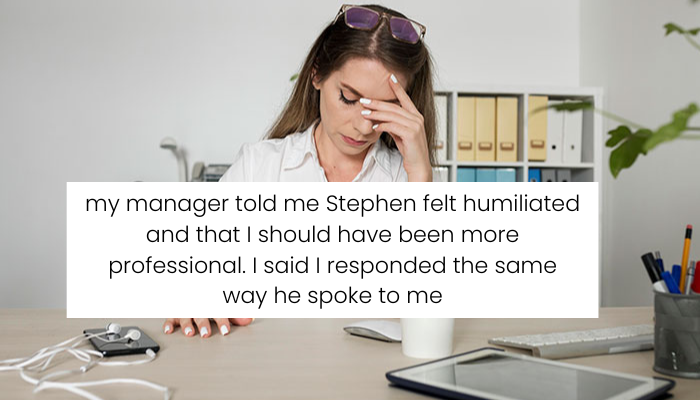Coworker’s Racist ‘Joke’ Backfires When OP Serves a Perfect Clapback
The original poster (OP) — a 23-year-old woman belonging to a minority group — suffered from regular microaggressions from a male coworker, Stephen, 34, in a workplace that was otherwise laissez-faire on casual racism. His comments went from somewhat passive-aggressive references to her race to just straight-up saying she was hired to ‘check diversity boxes.’ OP decided to ignore him until he finally crossed the line when he made a remark about her getting a promotion. In a tongue-in-cheek response, she reminded him it was HIS lack of progression in the job the joke was based on.
Everyone in the room thought it was hilarious when Stephen first jabbed OP but when OP jabbed back, the room fell silent. A while after that, Stephen said he felt “humiliated,” and OP was deemed “unprofessional” by management. Instead, her response only reflected back how he’d addressed her — opening up the question about whether or not workplace culture is being transformed, with discrimination coming disguised as humor.







Workplace Microaggressions, Double Standards & Legal Implications
1. The Subtle Harm of Workplace Microaggressions
OP’s experience illustrates such a common and yet so often missed issue in corporate world — micro-aggressions! These are micro-aggressions, which is indirect, sometimes subtle for example, that binary gendering can help reinforces stereotypes which deems marginalized employees unwelcome. Microaggressions at work have been found to affect women of color most adversely, harming their career success and satisfaction, according to a study published in the Harvard Business Review.

For example Stephan’s comments asking where OP is ‘really from’ and assuming she must be good at silkpainting because of her background. The American Psychological Association (APA) reports that microaggressions — even though they sound innocuous — lead to increased stress, decreased engagement at work, and even health problems.
2. The Double Standard in Workplace ‘Jokes’
The pivotal point in OP’s story is that when Stephen expressed discomfort it was taken seriously but when OP did, over and over, they were brushed off. This is emblematic of a widespread office double standard—where the homeboy is free to make offense joke in the name of humor, but when the energy is matched the cast is unprofessional.
This bias isn’t anecdotal — women on average pay a higher price for behaving similarly to white men do, according to a study from Catalyst. In OP’s case, Stephen could make inappropraite comment after inappropriate comment, but in response to OP’s single comment, management issued a reprimand.
This demonstrates a larger workplace problem: who gets to decided what is just a joke and who is unprofessional? Often this means marginalized employees are expected to grin and bear racist, sexist, or otherwise offensive comments to keep “harmony,” while more privileged employees avoid having to ever feel uncomfortable.
3. Could OP’s Employer Face Legal Consequences?
Even if OP’s company has not yet formally done anything against her, its reaction to Stephen’s complaint likely makes this a viable case of discrimination and hostile work environment. According to the Equal Employment Opportunity Commission (EEOC), a hostile work environment occurs when someone is subjected to harassment based on their color, sex or national origin that makes the workplace intimidating or offensive.
Now, if OP had a history of making discriminatory comments (akin to the jokes Stephen tells) and the employer ignored them and instead issued him a warning for defending himself, that could be justification for an EEOC complaint. In Castleberry v. STI Group (2017), a single comment about an employee’s race was found to be sufficient to support a claim for a hostile work environment if the comment was sufficiently static (source).
Employers had better provide a free from discrimination and harassment workplace, and if they don’t take action after OP’s company continues to discriminate against that business could possibly be liable. Google and Tesla were hit with multi-million lawsuits for creating a toxic environment in which discrimination was tolerated.
As her story went viral, the woman provided more information on the conflict







This response to OP was potentially the best comeback (but not quite) to Stephen as it brought to light not only his hypocrisy but also the much deeper issues at play here that is workplace discrimination and how HR policies are ineffective in helping those who were made to be a scapegoat and those who think they are virtuous while perpetrating the very ethics they flaunt. Her tv return was pleasant — but the response from the agency almost tells this new era needs to be systemic. Companies need to realize that diversity and inclusion goes beyond hiring quotas and needs to be work done to make sure anyone employed is treated fairly.
I would recommend that if OP is still going through this, she should start documenting these micro aggressions and bring her findings to HR with a formal complaint. If the issue remains, she may consult with an employment lawyer to guarantee that her rights are safeguarded.

